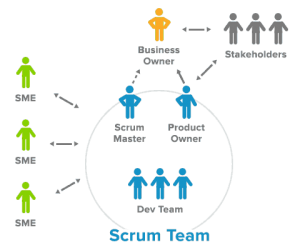A social media content calendar empowers marketers to keep organised and publish higher quality content without the last-minute panic.
The best social media content calendar for your brand might be as simple as a Google Sheet or as complicated as a customised dashboard integrated with your scheduling software. Either way, this must-have tool enables you to plan ahead, reducing stress and levelling up your content game.
What might sound like a significant commitment at first will repay serious rewards in no time. Here’s everything you need to know about social media content calendars. Stick around until the end for example calendars, templates, and free tools.
Let’s get started.
What is a social media content calendar?
A social media content calendar – sometimes referred to as a social media editorial calendar – is a spreadsheet, software service, or old-fashioned paper calendar used to plan social media posts. They detail which content will be published and when, track deadlines, and sometimes assign responsibilities to different team members.
There is no right or wrong way to create a content calendar – some are basic, and others are multi-dimensional. The aim is to align your calendar with your brand’s big-picture social media goals.
Who can benefit from a social media content calendar?
Content calendars are not just for international brands (see: National Geographic’s editorial calendar toward the end of this guide) with hundreds of thousands of followers and fans. The organisational power of calendars benefits just about anyone that creates social media content for a business, including:
- Bloggers
- Consultants
- Freelancers
- Marketing teams
- Media companies
- Small businesses
- Social media managers with one or several clients
What are the advantages of a social media content calendar?
Image via https://unsplash.com/photos/kLmt1mpGJVg
Time is a crucial consideration when weighing the pros and cons of new systems and processes. If you’re like most social media marketers and small business owners, you simply do not have the bandwidth to waste resources on dysfunctional tools that promise the world and underdeliver.
A social media content calendar is not one of those tools. Why? Because it lets you achieve the following instant advantages.
Get organised to save time
Achieving success on social media is a marathon. It demands effort and attention day in and day out. Sometimes it feels effortless – the clouds part, inspiration hits, and you create engaging, audience-focused content that drives growth across your preferred channels.
But most of the time, it’s hard work.
If you’ve ever sat staring at your phone, wracking your brain for that witty one-liner needed to bring your Instagram post to life, you know exactly what we’re talking about.
Creating and maintaining a content calendar allows you to batch your work, reduce multitasking (which reduces the quality of your output), and capitalise on moments of inspiration. In other words, no scrolling desperately through inspirational quotes at 4:59 pm on a Friday.
Keep up post consistency
If there’s one secret to success on the internet (and life), it’s consistency. It doesn’t matter if you’re trying to boost your reach on Instagram, win subscribers on YouTube, or leverage the SEO-power of blogging, consistency is crucial.
On social media, you want your content to regularly land in your audience’s feed, but not so regularly that your brand appears spammy.
Why? There are several reasons:
- You want your followers and fans to engage (like, comment, and share) with your content. If you’re not showing up in their feed often enough, you cannot build engagement levels and form a meaningful, authentic relationship with your audience.
- You want to increase brand awareness, so when an audience member is ready to buy the type of product or service you offer, your business is already front of mind. Success on social is about more than follower numbers and engagement levels. It’s about driving up your bottom line.
- You want to convert social media users into loyal customers, and that takes persistence and repetition. Conversions don’t (typically) happen overnight. Ever heard of the marketing rule of seven? Put simply, the rule claims that a prospect must be exposed to at least seven touchpoints with your brand before they make a purchase.
Remember, social feeds are not chronological – nuanced and ever-evolving algorithms determine if and when your content is shown to a particular user.
Reduce the risk of errors
Where humans are involved, human error follows. And there are few things in life more gut-wrenching than spotting a glaring typo hours after you have sent an email, published an article, or posted to social media.
Planning your content ahead of time gives you the space you need to incorporate fastidious copy-editing into your workflow. It’s not just typos and spelling mistakes on the line, either. Fact-checking information and seeking approval from your organisation’s executives or legal team are more easily done before you’ve hit publish.
Capitalise on timely opportunities
Did you know the last Wednesday of March is Manatee Appreciation Day? Or that 14 June is International Bath Day, a holiday with origins dating back to Ancient Greece?
Admittedly, those holidays are pretty niche, but things like Mother’s Day, ANZAC Day, and Star Wars Day may be relevant to your brand’s messaging. And a content calendar ensures you never miss an opportunity to publish timely, relevant social media posts.
What’s more, if your content calendar covers all the basics, when breaking news hits the press, you have the creativity and logistical capacity to run with it.
Execute a more complex social strategy
Social media marketing is not always as straightforward as keeping up with your three-posts-per-week regime. Often, you have several campaigns running concurrently, each with distinct goals and audiences. Layered on top is your day-to-day posting, as well as activities for engaging with users and growing your follower base.
The elements of an optimised social media content calendar take the guesswork out of the daily grind, giving you and your team more time to dedicate to complex, multi-faceted, and experimental strategies.
Publish better content
Forget memes and cat videos. Social media is now a high production value marketing space saturated with meticulously crafted content curated by entire teams of industry professionals. Calling in your copywriter and videographer on their afternoon break to whip up an urgent Instagram post isn’t the best way to produce engaging content.
Quality takes time, and poor quality means poor results.
With a content calendar in-tow, you can strategically allocate resources and talent to ensure every team member has the time and mental energy needed to produce exceptional work.
Let data lead the way
More than 40 per cent of brands want to expand their budget for data-driven marketing – and for a good reason. Businesses have access to more data about their target audience than ever before. Zero in on social media and you have stacks of meaningful data sets to trawl through: audience demographics, user behaviour, and content engagement, to name a few.
Drawing actionable conclusions and using data to shape your content strategy is not something that can happen on the fly. Planning is essential. Testing is vital. Revisiting your analytics to measure performance is a must.
With a social media content calendar, you have the breathing room required to incorporate insights into content creation.
How to create the best social media content calendar
You can create an effective, time-saving, content-improving social media calendar in seven steps:
- Review your content
- Select your social media channels
- Define your calendar’s scope
- Create an asset library
- Map a workflow
- Craft your posts
- Bring in your team for feedback
A quick note: Before you begin, make sure you and your team are clear on your brand’s social media marketing strategy. Your content calendar will be far more powerful if it supports measurable goals.
Step 1: Review your content
You can’t get where you want to go without knowing where you are.
First, take the time to review your social media content and gain clarity over the successes and failures of your current approach. This audit process is crucial to unlocking the full potential of your content calendar and maximising ROI across your social channels.
Here are some questions to guide your content review:
- Are profiles up-to-date? Do they contain incorrect information?
- What are your goals for each platform?
- Who is your audience? Have you fleshed out living, breathing personas?
- How do you measure success on each platform? What are the KPIs you need to track?
- List your most successful posts. What do they have in common?
- What new features (think Instagram Reels, for example) are you not using? Do they make sense for your brand?
- If you have a team, who is responsible for what? How do you build accountability into your workflow?
- Is your current social media strategy contributing to your overall goals?
Your content review is the foundation of your social calendar, so don’t take shortcuts or cut corners.
Step 2: Select your social media channels
Social platforms are not all things to all people. For example, a huge sixty-two per cent of TikTok’s users are under 29 years old. In contrast, about seven in ten Facebook users are over the age of 25. Which channels you target will depend on your audience’s demographics.
What’s more, different platforms encourage different user behaviour. On Instagram, people want inspiration, so they are more likely to shop products using the app’s built-in checkout. On Twitter, they want news, so they may be prone to clicking through to your latest thought leadership piece. On Facebook, they want to argue about politics – do with that what you will.
In summary, spend time on social media channels that meet the following criteria:
- Appeal to your audience
- Align with your goals
Tick these two boxes, and you’re golden.
Step 3: Define your calendar’s scope
Your content calendar is in its infancy, but now’s the time to start adding flesh to the bones. The next step involves scoping your calendar:
- Where is it going to live?
- What will it look like?
- What information does it need to track?
There’s no one-size-fits-all answer to these questions. If your weekend side-hustle is making cupcake-scented candles, a basic spreadsheet might do just fine. If you’re the top dog on a team of 12, you need something a little more comprehensive and collaborative.
Regardless, you’ll likely want to track the following information:
- Copy
- Date to be published
- Images or videos and where to find them
- Link to the published post
- Social platform
- Time to be published (don’t forget the time zone)
- Who’s responsible for publishing or scheduling the post
You can also experiment with recording more sophisticated details, such as:
- Approved or not approved
- Broader campaign, such as a product launch or special event
- KPIs
- Organic or paid, and if paid, budget and audience details
- Post format, for example, a Story, IGTV, or post on Instagram
Don’t waste time digging up more detail than necessary. Make sure the information you track adds real value to the process.
Step 4: Create an asset library
Your team needs access to the visual assets cited in your social content calendar, which means you can’t hoard photos and videos on your smartphone. Instead, you need a cloud-based storage solution that delivers reliable, secure, anytime, anywhere access.
Your business likely already uses Dropbox, Google Drive, or something similar to enable seamless file-sharing and collaboration. As long as your storage quota allows, there’s no need to introduce new software into the mix.
How you organise your asset library is key to streamlining your social scheduling and posting workflows. Establish and stick to naming conventions and a logical file structure: something like Social > Instagram > 2021 > April > Video.
Step 5: Map a workflow
What are you actually going to do with your content calendar?
Answer this question by mapping your daily, weekly, and monthly workflows. Here’s an example:
Daily:
- Publish content
- Monitor engagement
Weekly:
- Brainstorm content ideas
- Check analytics
- Review and optimise sponsored posts
Monthly:
- Write content
- Create or source visuals
- Note upcoming holidays or events
- Seek approval, if needed
- Schedule content
- Review big-picture goals
Mapping your workflow isn’t just about what. It’s about who. You’ll need to assign each activity a team member, so everyone is clear on what is and isn’t their responsibility.
Jot down your content calendar’s workflow and save it in a shared folder for clarification and future reference.
Step 6: Craft your posts
It’s time to put your workflow into action and populate your content calendar. There are two phases to this step:
Curating relevant, value-add content
Social media gives you direct access to your target market. It’s powerful stuff, but you know how the cliché goes: with great power comes great responsibility.
It’s essential to not only your success on social but also your brand’s reputation to publish content that is relevant and valuable to your audience. Add to that maintaining authenticity and communicating your brand’s voice, and you have a mammoth task ahead.
Instagram users have uploaded more than 50 billion photos since the app’s inception. Your content must cut through their over-saturated feeds and speak to their wants, needs, and pain points.
Informed by data and led by a robust strategy, you can shape content that attracts, engages, and inspires your followers. And it’s this kind of mindful, conscious, measured content you need to populate your calendar.
Testing the usability of your chosen content calendar
Post quality aside, think of this step as your calendar’s soft opening. It’s a trial run, and now’s the time to speak up and make objections. Ask yourself and your team the following questions:
- Are there any features you didn’t expect but enjoy?
- Are there any finicky glitches slowing you down?
- Does the calendar include the information you need to grasp both the specifics and the bigger-picture strategy?
- Are you including too much information?
- Does the calendar provide the visibility you need?
- Have you discovered any shortcuts? If so, share with the team.
- How could the calendar be improved? Does the chosen platform (i.e., spreadsheet or app) allow for that improvement?
- Is the calendar intuitive to use?
Iron out the kinks before investing significant resources into your social media content calendar. This is your opportunity to tweak, adjust, rethink, and even switch platform.
Step 7: Bring in your team for feedback
The people that use your brand’s content calendar daily should be the final judge, but other colleagues may need to dip in from time to time. Give all of them access to what you and your marketing team have created. Ask for their feedback. Pick their brains.
Remember, your content calendar needs to be usable and accessible, even to those that might struggle with new software. Get them to check boxes, approve posts, edit copy, and test out any other tasks that might need doing in the real world.
Finish this step, and you have a solid document ready to be put through the paces. You heard right – you can finally start publishing and scheduling content.
Social media calendar ideas
Here’s a few ideas on how you can approach your calendar:
By season
This is a no-brainer if your audience follows a predictable calendar.
Let’s say you’re in fashion – winter means warm clothes and hot mugs of cocoa, summer is dresses and smiling on the beach.
If your first thought was ‘damn my audience is about as predictable as a bouncing coconut’, look at your data. You might find some surprising trends you can bank on.
Speaking of which…
By trend
For those in the fast line where fads grow and fade in weeks or even days – there’s still power in a calendar.
The key is to getting an understanding of the lifespan of the trend AND your ability to get the most content out of it.
It might be as simple as a meme (with a lifespan of 2 days) or an industry-wide shift (which might take months to come to grip with).
Even if the best you’ve got is a guesstimate, planning out short content calendars can still save you hours and let you ride the trend, rather than follow it.
By event
There are two types of events:
Within locus of control (things you have influence over) and Out of locus of control (things you can’t change).
Your locus of control events are your webinars, campaigns, or launches. With a set date and audience in mind, you’re basically filling in the blanks to build excitement pre-event, and look at results post-event.
Your out of locus events are things like news. Like setting a calendar by trend, you’ve got to guesstimate how long and how much content you can get out of it and plan your calendar accordingly.
By test and measure
If none of the above would work for you, then you want to plan your calendar around testing and measuring.
You can start simple:
- Does my audience want to see content about [something new]?
- Do they prefer longer or shorter content?
- Will they engage more if shift my focus to Reels instead of straight posts?
Once you’ve got your hypothesis in mind, build your calendar and following content to test it out.
Don’t set your calendar by ‘whatever’
A calendar planned around nothing is just doing ‘stuff’. At best, you’ll know what you can do.
At worst, you miss out on connecting with your audience, giving them a reason to connect with you, and gaining an understanding of what makes them tick.
Leveraging your social media content calendar’s full potential
A content calendar can save you time, improve the quality of your posts, and propel your brand toward social media success. But there’s one last thing: you must revisit your calendar regularly.
Don’t let this game-changing tool sit in the corner gathering dust. Use it. Adjust it. Allow it to evolve alongside your business and the broader social media landscape.
If you can keep yourself and your team engaged with your calendar and committed to the process, your investment will repay dividends.
Digital & Social Articles on Business 2 Community
(51)
Report Post



